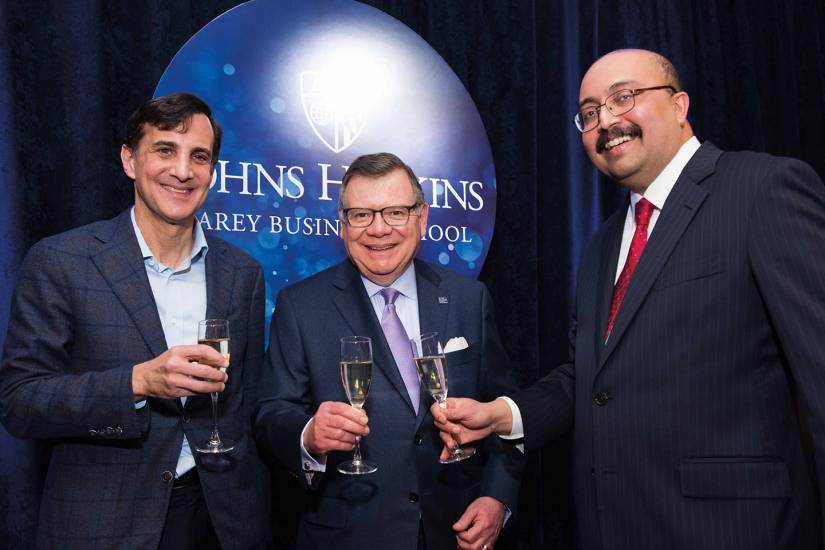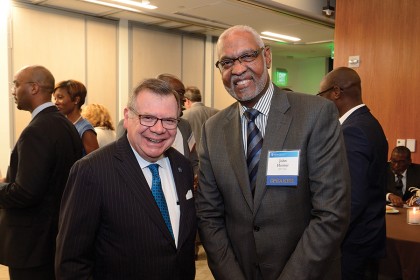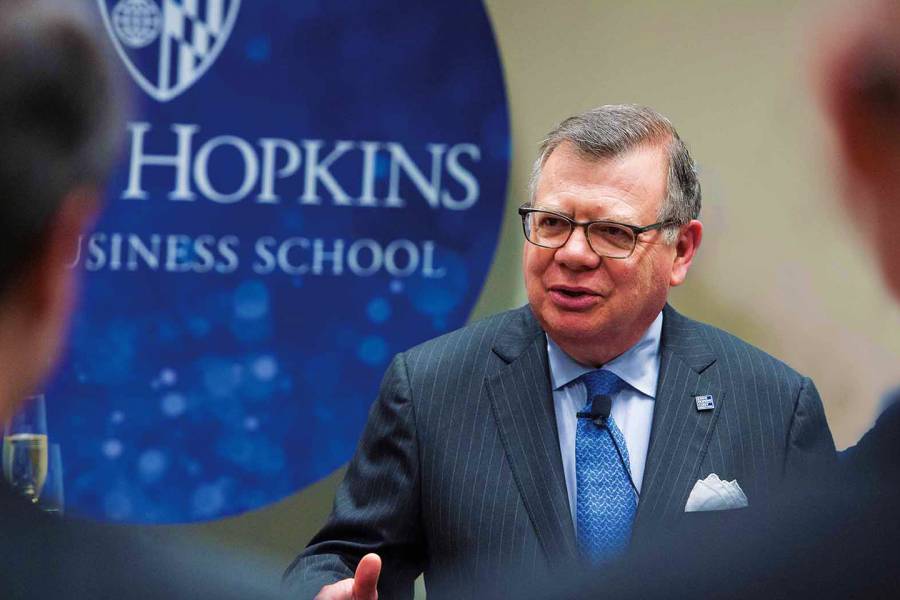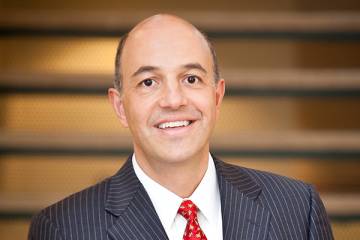After seven years as dean of the Johns Hopkins Carey Business School, Bernard Ferrari has big plans for his retirement. He'll spend some time traveling, but as someone who's spent most of his life juggling the demands of academia and career, he says he mostly looks forward to having nothing to do.
"People fear boredom," he says, "I'm going to embrace it and see what it is like."
Ferrari was recently named dean emeritus of the Carey School, and his successor, Alexander Triantis, assumes the role of dean Aug. 15.
Carey Business magazine sat down with Ferrari to discuss his accomplishments and legacy, the lessons he's learned over the years, and some sage insights from an ancient Roman statesman.

Image caption: From left: Johns Hopkins University President Ronald J. Daniels, Dean Bernard Ferrari, and Provost Sunil Kumar toast to the Carey School's accreditation in 2017.
Image credit: Homewood Photography
Bernie Ferrari, 2019 version, travels back in time and meets Bernie Ferrari on July 1, 2012. What's the best piece of advice that 2019 Bernie could give to 2012 Bernie about his new job as dean of the Johns Hopkins Carey Business School?
I could have been better versed in the history of Johns Hopkins University and the individual schools. That would have helped me better understand what Carey's potential impact on the university as a whole and on the individual Hopkins schools could be. Each Hopkins school has a history. Each school has a set of goals and objectives. It took me a little longer than I would have liked to understand them—knowing where the forces at work were within the university and had been for many years.
Before you came to Carey, did the thought ever cross your mind—
Never. Never.
—that you might become a dean in higher education someday?
I never thought I would be part of a university administration. So when the opportunity came to be the dean at Carey, I thought about it very carefully. The thing that attracted me was it presented an opportunity that nothing in my background really made me deserving of. Frankly, I was kind of a strange pick for the university to make.
But the opportunity to stand up a new business school within a major research university was so unique—and there were no real examples that had occurred in the modern era, certainly in the last 20 or 30 years—that I thought it would be quite an interesting adventure.
How has Carey's newness been an advantage?
The advantage is that our faculty have had the opportunity to make the school reflective of some new developments. The school can take new paths without having to engage in long processes to change what has been done for decades. It can be lighter on its feet. It can craft its governance to meet the needs and demands of the marketplace, which is very hard to do in a university where there can be embedded governance structures and processes that nobody wants to give up.
So because of the fluidity of the governance, and the fluidity of talent in the organization, we've had terrific degrees of freedom.
How has that newness been a disadvantage?
We don't have a large endowment to help us support initiatives. We don't have a long-established win-loss record that would bring us a durable reputation. Being new, it's difficult to break into competitive arrays like rankings that are measured by criteria that favor established norms—norms that we question as to whether they are really relevant to what a modern business school is about. But weighing one with the other, I'm happier, and I think the faculty are much happier, being where we are versus being at a more established place. It's chocolate and vanilla ice cream; they're both good, but people prefer one or the other.
Have you ever compared notes with other B-school deans who came from industry and not from higher education?
It's a pretty small club, but I've talked with some of them about this. Ken Freeman, the dean of Boston University's business school, is one; he spoke at our spring graduation last year. The main difference is that processes in industry and in academia are different. They're more streamlined in industry. Here, it's a much more complicated decision-making choreography.

Image caption: Carey Dean Bernie Ferrari (left) worked with Dean’s Advisory Council member John Hunter to launch the Leading a Diverse Society Initiative.
Image credit: Will Kirk / Johns Hopkins University
I think we've done a pretty good job here of streamlining it as much as we can without cutting out very important constituents. We've created some design features around decisions that have allowed us to move more quickly. That has been based on a high degree of trust at the school, among staff, students, faculty, and the top leadership, and that trust comes from transparency. We've all committed to being extraordinarily transparent in what we do; no surprises. We have clearer decision rights in the dean's structure and faculty structure here than you see at other schools, including other schools within this university.
Our newness allowed us to structure things that way. We didn't tear down something that was fitting 50 years ago or even 10 years ago.
The nature of business education today is that the needs and demands of students and employers often shift. It calls for an agility on our part. I don't mean to minimize anything we do, because all of it is important, but sometimes you feel you're in the fashion industry. You just ordered 50,000 T-shirts, and everybody wants polos this season. Universities are notoriously bad at getting a faculty to be agile enough to react to the marketplace shifts. Curriculum changes take an enormous amount of time at most schools; at our school, we do them pretty rapidly, yet with care and quality.
Why do business schools exist, in the broadest sense? Why do we need them? What do they provide to the world?
Business schools are very good at certain things, and one of them is conveying a core of knowledge that you must have if you're going to be a good problem solver in business. Also, business schools turn out a lot of graduates with core competencies, core concepts, and a core lexicon. Do not underestimate the power of more and more people sharing the same language and the same meanings for words. A common lexicon is very, very important in any profession. That's a powerful tool, and business schools influence how it's used. You don't have to go to business school to go into business. But I would tell you that all those who have been successful in business have learned the common lexicon of business. Also, if business schools are doing their job, they are teaching students to sense what is around the corner. They are sharpening a student's instinct for change.
In what ways has Carey been an asset to the university?
Universities can be hermetically sealed, and everything they do tends to be quite inward-looking. At places like Johns Hopkins that have various divisions, each school in its own way has portholes to the outside that let fresh air into the university. Business schools play a big role in letting fresh air in. It's unfortunate that sometimes, because of the great wealth that has been amassed in some business schools, there's a tension between those schools and their universities over assets. So you start to get a moat effect around the school.
My view is that you want to build as many bridges between university divisions as you can. That leads to greater institution building for the entire university. I would like to think we've done a pretty good job at that here. If you look at our faculty's current roster of about 80 research projects with faculty from other Johns Hopkins schools, that's a pretty powerful statement.
Which of the school's accomplishments are you most proud of as dean?
Earning accreditation in 2017 is certainly one of them. We met a set of standards, and we met them quite quickly.
But I think the secret sauce of Carey is something hard to quantify. It's culture. It's about how we think about the future, how we govern, how transparent we are, how people interact with each other, how we solve problems. I see evidence of our success in those areas every day. Those are the things I'm most proud of, and we've accomplished them in a very short time. They define the kind of institution building that we've done.
Another key accomplishment has been the growth of our faculty. I can remember, when I accepted this job, I had some friends in the business world who asked whether I needed a cranial MRI. They all sang the same song, which is the impression that everyone has of academia: "How are you going to put up with the faculty?" As if faculty are a bunch of ogres who live to make the dean's life miserable.
At Carey, in my case, that couldn't be further from the truth. I found the faculty to be extremely hardworking, unselfish, responsive, dedicated, supportive, coordinated in leading us in the right way, and possessing a remarkably high tolerance of ambiguity.
They've been a great thinking machine. I've been so impressed by how they take any idea and make it better.
They've helped make this school a great place to be a leader. The best kind of leadership is if your troops are going in the right direction, and you can follow them. (Laughs) So all those warnings I got about unruly faculty didn't pan out. I've seen examples of it at other universities, but not here.
How do you assess the school's efforts to instill in the students the idea of being both good at business and good at community building?
It's a challenge that we've thought about a lot. Most people who come to business school are different from people who go to, say, nursing school. Nursing has a long history, a focus on the care and comfort of people, so you don't get into that profession unless you share that general idea. In business, there is no overriding concept for everyone in the profession. So, a lot of people associate business with a "survival of the fittest" type of struggle, a win-lose situation rather than a win-win.
Those ideas can create some very… interesting dynamics and behaviors in individuals, not all of which are good. So we've done a lot of work here to underscore the choices that businesspeople face, in terms of how their behavior and decision making affect others. We've really tried to emphasize this dual idea of business leader as leader of society.
How have our students taught you during your time as dean?
Most of our students are more than 40 years younger than I am. I've learned a lot about generational changes and attitudes, and they've been patient to teach me that. A great positive I see in them is their desire to shape society in very good ways, where they see disparity and less-than-ideal circumstances.
Also, I've come to learn more about the differences between our full-time and part-time students. The part-time MBA program can't be just a reproduction of the full-time MBA. The part-time students have very different needs. They're at different stages in their lives, compared to many of the full-time students, so they come to their schooling here in a very different way. It's been a rapid learning curve for me and others here at Carey, and for the business school industry in general.
We're learning more and more about this, including the fact that online education is becoming a very powerful tool for addressing the needs of the part-time student.
What advice might you offer your successor?
Oh, I'm not sure that would be either solicited or appreciated. (Laughs) So allow me to be very presumptuous and offer advice to any dean. I would stress transparency, involving the faculty in the decision making and problem-solving, being tolerant of what I would call the fluid organization. Don't overstructure things, don't get too fancy. Allow people to come together and challenge each other in new ways.
Another piece of advice would be to keep looking for handholds in other parts of the university. By that, I mean all the initiatives that reflect the cooperation and collaboration Carey has had with other Hopkins divisions. Continue to fund those collaboration because it's very important and something this school is good at.
Allow the school to have some "laboratory" time. Try new things—new courses, new ways of evaluating, new ways of giving feedback. Don't get stuck in the same old approaches.
How does a young school, as it matures, avoid falling into the pitfalls you've mentioned about long-established schools?
You build a culture that brings you back to center. Organizations can drift away from their values and purpose. But if you have a culture that responds quickly to change and is adept at problem-solving, then you'll be less susceptible to big swings. You adjust and move on. We've worked hard to build agility into our DNA at Carey. Even as we age, we can remain youthful. In organizational terms, that means we will continue to be on an interesting journey.
Any big plans for retirement?
I'm reading a book to help me with this. It's by someone who may not be recognized as a counselor in these matters, but I have found him to be extraordinarily insightful: Cicero. He wrote a book called How to Grow Old. I don't consider myself old, but I'm older. The book has the original Latin on one side, and the English translation on the other side. It's brought back memories of my reading Cicero in high school.
Basically, what he says is, "Get to it." Just keep doing what you want to do. The good thing about not having to go to work every day is that you have the opportunity to engage your interests in a very different way. I don't know how I'll do that yet. There's some travel that my wife and I have always wanted to do, without having a cellphone close by because you had to. For almost my entire life, I've gone to school and worked, so I'm going to embrace boredom for a while. People fear boredom; I'm going to embrace it and see what it is like. Most say I'll last less than a week.
As Cicero puts it, give yourself some time to think. He also says, you still have time to plant trees for the future.
Posted in University News, Voices+Opinion
Tagged bernard t. ferrari, q+a










